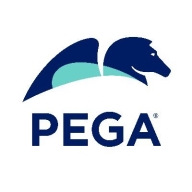

Pega Platform and Bizagi compete in the business process management category. Pega appears to have the upper hand for enterprise-level solutions due to its robust features, while Bizagi is more accessible for smaller businesses or straightforward BPM needs.
Features: Pega Platform excels with enterprise solutions, case management, integration services, and a no-code approach supported by Pega Cloud for seamless deployment and rapid releases. Bizagi offers ease of use, quick setup, and robust process automation features suitable for agile development.
Room for Improvement: Pega could improve its complexity and lower licensing costs, as users find it daunting and expensive. Enhancements in integration capabilities and user interface are also suggested. Bizagi could benefit from better case management and simulation features, despite its general usability, as well as improved integration with external services and cost management.
Ease of Deployment and Customer Service: Pega offers flexible deployment options across on-premises and cloud environments, though its customer support varies in responsiveness and expertise. Bizagi provides straightforward cloud and on-premises deployments with generally positive technical support, though improvements are needed for complex issues.
Pricing and ROI: Pega is often perceived as costly, with a substantial ROI in large organizations, especially in financial sectors. Bizagi offers more accessible pricing with a free modeler, attractive to smaller businesses, though some users note recent price increases. Bizagi delivers competitive value and ROI for smaller-scale implementations.
The toolset is very intuitive, so we didn’t need to contact their support much.
We cannot expect major customer support.
The technical support from Pega is very low, rating a one or two out of ten.
I never needed support from the platform standpoint, but if additional features are required, we have regular meetings with the product team for feedback.
Pega's technical support team is very helpful.
There is no direct scalability option.
If I rate scalability from one to ten, I would probably give it a six.
Currently, big banking providers and insurance providers, even the members for healthcare payers, are using more than millions of operations on a daily or weekly basis.
The decision map could be improved to allow more than three options at a decision point.
For more mature environments, the integration to live systems is lacking, which affects its applicability.
Reporting capabilities can be improved more, and community support should be increased.
With the recent development of AI agents in Pega Platform 24.2, the adoption is not heavy due to regulations around using external LLM by customers, especially regulated customers in BFSS and healthcare.
Pega introduced Constellation, which allows a user to build a more engaging visual experience.
My learning curve in robotics has been challenging.
It was less expensive than some of the other tools.
Pega is priced higher than open-source options like Flowable but is suitable for large-scale industries like banking and insurance.
The pricing is expensive, and this is an issue.
From a licensing perspective, it is higher than the competition.
It is open source.
The user interface is very good, making it easy for business people to understand.
Bizagi has rich functionalities; compared to other BPMN tools, it has more features.
Pega Platform is excellent for enterprise-level solutions with integrations to entire systems, including case management, service orchestration, CRM, decision-making capabilities, digital process automation, and AI-driven functionalities.
Management capabilities such as dashboards.
| Product | Market Share (%) |
|---|---|
| Bizagi | 5.6% |
| Pega Platform | 5.2% |
| Other | 89.2% |


| Company Size | Count |
|---|---|
| Small Business | 42 |
| Midsize Enterprise | 16 |
| Large Enterprise | 37 |
| Company Size | Count |
|---|---|
| Small Business | 9 |
| Midsize Enterprise | 15 |
| Large Enterprise | 68 |
Bizagi’s industry-leading low-code process automation platform connects people, applications, robots, and information. As the most business-friendly and flexible solution on the market, Bizagi enables true collaboration between business and IT, delivering faster adoption and success. Fuelled by a community of 1 million users, Bizagi powers over 1,000 organizations worldwide including Adidas, BAE Systems, and Old Mutual. For more information visit www.bizagi.com
Pega Platform facilitates business process management, case management, and workflow automation for industries like banking, insurance, and healthcare. It supports digital transformation and customer service enhancements with its low-code capabilities and seamless integrations.
Pega Platform enables users to create efficient systems for case management, financial operations, and digital transformations. It provides tools for client onboarding, quoting, claims processing, customer experience improvements, and content management. Pega's low-code approach allows for the automation of complex processes, making it suitable for enterprises looking for adaptability and rapid deployment. While it offers strong real-time analytics and decision automation, users acknowledge challenges in user interface, integration, and performance aspects. High costs and a learning curve need attention, and enhancements in AI features and cloud services are desired.
What are the key features of Pega Platform?In banking, Pega Platform automates loan processing, accelerates customer onboarding, and manages compliance. Insurance companies benefit from streamlined claims processing and policy management. Healthcare sectors use the platform for patient engagement and care coordination, enabling organizations to adapt quickly to changing industry requirements.
We monitor all Business Process Management (BPM) reviews to prevent fraudulent reviews and keep review quality high. We do not post reviews by company employees or direct competitors. We validate each review for authenticity via cross-reference with LinkedIn, and personal follow-up with the reviewer when necessary.